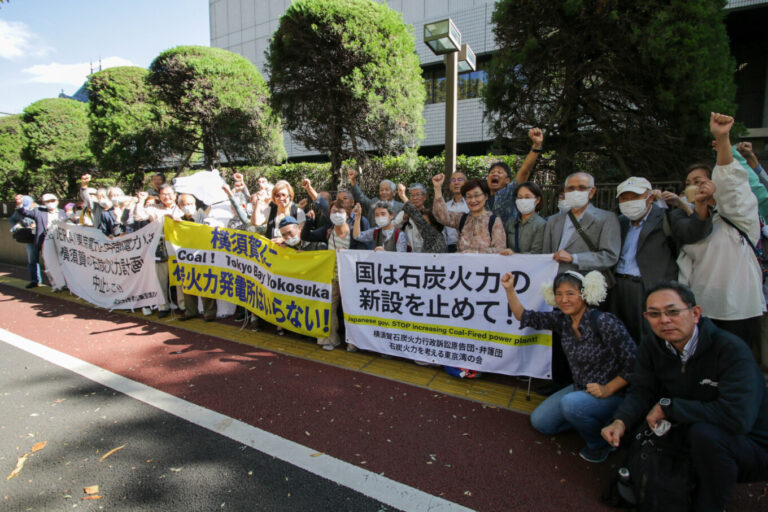On October 23, 2024, Japan’s Supreme Court dismissed the Yokosuka coal-fired power plant lawsuit. In this “Yokosuka Climate Case”, 45 local residents (with 3 others joining later) filed a lawsuit in the Tokyo District Court seeking for the Ministry of Economy, Trade and Industry (METI) to rescind its notice for the Environmental Impact Assessment (EIA) of construction of the “Yokosuka Coal-fired Power Plant New Unit 1 and 2 (tentative name)”, planned by TEPCO Fuel & Power (later transferred to JERA) on May 27, 2019. This large-scale coal-fired power plant, with a capacity of 1300 MW in total (2 units of 650 MW), would emit 7.26 million tons of CO2 per year, more than the old oil-fired power plant that used to be on the same site.
The plaintiffs primarily appealed based on the following arguments:
1) Considering the threat to the living condition of local residents due to climate change and to achieve the Paris Agreement goal of “holding the increase in the global average temperature to well below 2°C (above pre-industrial levels) and pursuing efforts to limit the temperature increase to 1.5°C,” any new coal-fired power plant should not start operation after 2020.
2) It is illegal to claim that the project was a replacement, as well as METI simplifying the EIA on the grounds of less environmental impact than the previous (existing) oil-fired power plant.
3) It is intrinsically unfair that the plan had decided to use coal as fuel from the beginning of the EIA, and did not present any alternative fuels that would emit less CO2 and other air pollutants.
After an unfair verdict by the Tokyo District Court on January 27, 2023, and another unfair verdict by the Tokyo High Court on February 22, 2024, an appeal and petition for acceptance of appeal were filed with the Supreme Court on April 30, 2024, but the Supreme Court issued a decision to dismiss the appeal on October 23, 2024.
The attorneys and plaintiffs issued the following joint statement and pledged to continue fighting to shut down the coal-fired power plant as soon as possible.
Joint statement by attorneys and plaintiffs regarding
the Supreme Court’s decision to dismiss the Yokosuka Climate Case
In a decision dated October 23, 2024, the Supreme Court dismissed the plaintiffs appeal and denied the petition for acceptance of the appeal by residents and fishermen in and around Yokosuka City seeking the revocation of the administrative disposition by METI with implications for the suspension of construction and operation of a new coal-fired power plant planned after 2015, when the Paris Agreement was signed. The decision was based on the standard decision text, “The grounds for the appeal do not correspond to the grounds for a lawful appeal or petition for acceptance of appeal,” and did not indicate any judgment on the issues in the case. As a result, the operation of a coal-fired power plant in Yokosuka City, which emits a large amount of carbon dioxide, 1/5000th of the world’s emissions, was allowed to proceed.
Nowadays in Japan, cases of emergency medical care and deaths from heat stroke are increasing, disasters from heavy rains are occurring more frequently, and climate change is becoming increasingly serious on a global scale. Thus, reduction of greenhouse gas (GHG) emissions is urgently required to achieve net zero. Under these circumstances, Japan is the only industrialized country in the world building and operating coal-fired power plants, which emit more than twice as much CO2 as gas power plants. This is an outrageous act in the midst of strong calls for the abolition of coal-fired power plants, such as the United Kingdom, which ceased operation of all coal-fired power plants by the end of September 2024.
Coal-fired power plants emit enormous amounts of CO2, but the environmental assessment did not consider alternative methods of power generation and omitted important studies based on the sophomoric argument that “construction of the plant will improve the environment”. The Supreme Court, however, refused to address even these obvious violations and approved the illegal practice.
The time we have left to avoid catastrophe is limited. Not only politics, but also the judiciary, must change. We do not flinch in the face of this decision and will continue to fight for the abolition of coal-fired power plants as soon as possible, and by all possible means.
October 26, 2024
Plaintiffs and attorneys for Yokosuka Climate Case
Related Info.
Yokosuka Climate Case (Link)

